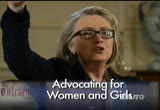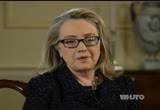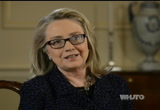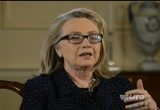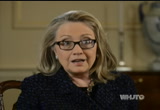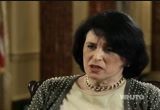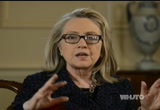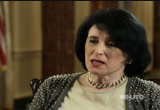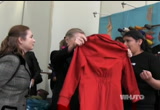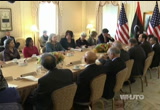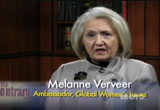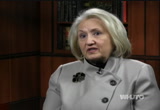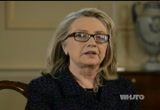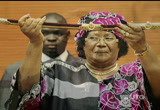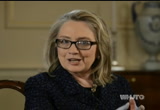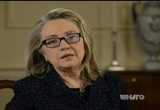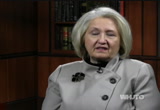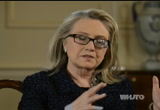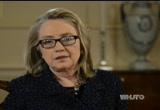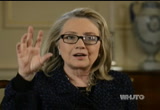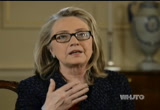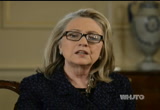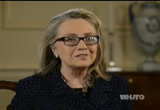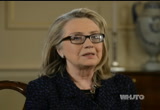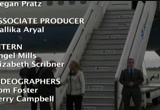tv To the Contrary With Bonnie Erbe WHUT February 2, 2013 10:00am-10:30am EST
10:00 am
clinton. >> funding "to the contrary" provided by... funding "to the contrary" provided by -- >> this week on "to the contrary," former secretary of state hillary clinton. >> women will yell. women try to human man nice human rights so i know it's penetrated the world culture. >> what would you say if you don't under up running for
10:01 am
president? >> hello, i'm bonnie erbe. welcome to the special edition of "to the contrary." this week an interview with former secretary of state hillary clinton. i sat down with her to talk about her incredible legacy for women and girls. >> you have changed the world for women and girls. where did your passion for this issue come from? >> i think it came from my childhood. it probably came from learning about the difficult childhood my mother had and how important it was for girls to be given the same opportunities as boys. i think it came from my own
10:02 am
experience as a kind of tomboy, playing in the neighborhood and hearing every so often, well, you know, girls can't play. it probably was something that was really a part of the atmosphere that i grew up in. and yet my parents, both my mother and my father, never made distinctions between me or my brothers or any of the children that were in and out of our house all the time. you know, they thought everybody should work hard and my father used to say, "work hard, play hard and don't confuse the two." and it was the same whether you were a boy or a girl. also i had great teachers in my elementary and junior high and high school years, who were inspirational, demanding, and expected as much out of the girls as they did out of the boys. >> now, the beige speech,
10:03 am
women's rights are human rights and vice versa -- >> now, on the eve of a new millennium, it is time to break the silence. it is time for us to say here in beijing and for the world to hear that it is no longer acceptable to discuss women rights as separate from human rights. >> did you think that was going to become iconic? >> i didn't really know at the time. i had quite a difficult decision-making process leading up to my going. there were those who didn't think that i first lady of the united states should go to china, that there were all kinds of political problems, that should not be ignored and therefore going might somehow condone it, none of which i agreed with. but i really didn't get the final go-ahead from the
10:04 am
administration to lead the delegation until quite close to the time of the speech. now, i'd been thinking about all these issues my entire life and had certainly begun working on them as first lady. so when thinking about the speech and working on it with my team, i knew that we had to be as clear as possible because ambiguity is not our friend in making the case for women and girls because people can always try to smooth off the edges and say, "well, she didn't really say that women should vote and women should have full equality, she said we should take better care of our women." so we had to be absolutely clear. and, you know, that statement could not have been clearer. the fact that it had to be made in 1995 was somewhat discouraging. and the reaction to it was certainly gratifying to me. but it just shows how much work there was ahead of us, that a
10:05 am
statement about humans rights being women's rights and human rights being women's rights was being hung on to with such desperation by so many people who were fighting their own battles around the world. so, of course, i'm gratified. i still have it quoted to me. i travel around the world as secretary of state and i'll be somewhere and women will yell "women's rights are human rights and women's rights are human rights," so i know it penetrated the global culture and that many places and many women and many girls have seen tangible progress because of it. but then i know how much more work there is to do to make it a reality. >> what's the singular most important thing you did for women and girls white at the state department? >> i think making the treatment of women and girls, the rights and roles of women and girls a central focus of american
10:06 am
foreign policy. and i didn't do it because it was a nice thing to do or it was some pet project of mine. i did it because the evidence is overwhelming. countries that deny political and social rights to women and girls are more unstable, more likely to breed extremism, more likely to threaten the united states. countries that deny economic opportunities to women and girls, rooted in education and business and investment are not going to be as prosperous as they might otherwise be. so it became clear that if i was going to be traveling around talking about diplomacy and development, urging changes in economic structures, introducing what we call economic statecraft to be a central pillar of our foreign policy you had to talk about women and girls and so i've tried to do that.
10:07 am
>> restrictions on women's economic participation are costing us massive amounts of economic growth and income in every region of the world. >> this work, ensuring that women are equal partners, as they should be, and are free to realize their own god-given potential, was one of the great pieces of unfinished business of the 21st century. with this equal futures partnership, we are taking an important step toward trying to finish that business. through this initiative, governments from around the world are making concrete commitments to support women in two key areas -- political participation and economic opportunity. >> have you gotten any guarantee from the president that that will be -- your work will continue under secretary kerry? >> yes. and under the president, i think the president has made very clear that this is a priority for the obama administration.
10:08 am
senator kerry did some very good work as a member and chair of the senate foreign relations committee in righting the treatment of women and the need to address abuses and problems. so i'm confident that women and girls will remain a singular essential part of american foreign policy. >> while she was secretary, clinton teamed the state department up with the gallup organization. that to collect hard evidence of the impact of investing in women and girls. clinton hopes it will be a tool for making a persuasive argument for such investments in the future and valuable policy information. >> we have strong evidence that women play roles in all kinds of things, and in particular, in peace-keeping and conflict prevention. they raise issues in these kinds
10:09 am
of negotiations, like human rights and human security. that are fundamental to forging a lasting and sustainable peace but we need more internationally comparable data to examine women's contributions affect conflict regions and only, then, can we really create 401(k)l0s for making sure they were included. >> secretary clinton logged nearly 1 million miles traveling to more than 100 countries, meeting with women and girls as part of her agenda whenever possible. >> that's good. very good. good for you. >> and she hosted women's groups and organizations such as the girl scouts here at home. >> tomorrow is the first ever international day of the girl child. i think it's fair to say girl
10:10 am
scouts were ahead of their time. when girl scouts were founded 100 years ago, that was pretty revolutionary. and even today i think in some parts of the world it would still be considered that. >> hillary clinton's passion for equality for women and girls led her to create the post of u.s. ambassador for global women's issues. she appointed melanne verveer, a long-time aide and friend. >> well, you know, as first lady she had impact on our own policies. it was she who very much became a proponent for micro credit for women who were in the poorest circumstances being lifted up with training and small amounts of credit. girls' education. so she had policy impacts certainly in development during those years. as senator she continued to be active on those issues.
10:11 am
the work that went on with afghan women early in 2003 recognizing how critical they would be to the creation of a better future for afghan women. she was very involved in when she traveled as a senator. she didn't travel that much internationally, but when she did, to afghanistan or to iraq, she met with all of the key people, but she always asked that she also meet with some of the key women. and then as secretary, she really made these issues a cornerstone of our foreign policy, obviously, in creating the position that i have, which is the first ever u.s. ambassador for global women's issues, it was sending a signal that the united states took these issues seriously, that we recognize that no country could get ahead if it left half of its people behind. and over the last four years, under her leadership, a great
10:12 am
deal of policy has been created. the president issued a national action plan on women, peace and security that recognizes that diplomatically and in development, in defense, we need to incorporate the role of women into our work in those areas, wherever it happens around the world. >> the post of global ambassador for women's issues, will that continue? have you been guaranteed that? >> yes. that will definitely continue. it was, as you know, the first time it had been done in our government. i think it has more than proved its worth to be able to say that the united states of america has a global ambassador for women's issues demonstrates that we have institutionalized the concerns that we all have about what we can do to make the world better for women and girls and by doing so, serve our own interests.
10:13 am
>> when you were meeting with female country leaders and negotiating, how was it different? >> it's interesting, the women who are in leadership positions right now around the world are a very interesting group. and they are both by their actions and their words, strong advocates for women. let me just give you a couple of examples. ellen johnson sirleaf, just reelected in liberia. she would not have been elected without support from women, particularly the market women, the rural women, who put their faith in her. and she is a champion of opportunities for women. joist banda who succeeded the president who died in office while she was vice president and faced real challenges to her assuming what, under the constitution, was her rifle position. thankfully, we and others supported her in making sure she took that position, and she has
10:14 am
a great commitment to women and their development. you look at someone like angela merkle, who embodies what a strong woman leader in a very difficult time faces. she is a friend of mine and is someone who i think has made a real difference in europe. and look at prime minister gillard in australia. she made a memorable speech about sexism. and some of the insults that were directed at her as a woman, not as a leader, i mean, that's fair game in any political system or democracy, certainly, you know, people don't agree with your positions, but to use sexist language to have a tinge of degradation attached to the criticism, she took it right on in the australian parliament. and i could go on. because, you know, look at
10:15 am
president rousseff in brazil who has taken a strong stand on supporting women and girls. and so i see that women leaders right now are not only exemplifying what it means to be a woman in power, they're all very different, the ones that i've just named, but they're also standing up for women in their society. >> you said you will continue to work with angela merkle and these other very powerful women you met while secretary of state. how? in what capacity? >> well, probably through philanthropic, charitable activities, certainly the clinton foundation, the clinton global initiative, and probably some organizations that i will be either initiating or joining, so that we keep the spotlight, that i use the position that i've obtained to really recognize and further action on
10:16 am
these issues. but it's not just women leaders. i mean, you know, the prime minister and foreign secretary of the united kingdom have made ending sexual violence an issue for the next g-8 so i want to work with like-minded leaders who see as i see that standing up against working to eliminate these abuses against women and open opportunities to women is a part of our security agenda, part of our economic and political agendas. >> one cannot understate the leadership that hillary clinton that is brought to these issues. her commitment has been consistent. her appreciation and understanding of why these issues are important. she has made the case all around the world. she has also made the case on -- in a way that shows leaders and talks to leaders about why this
10:17 am
is in their self-interest which i think in many ways her ability to communicate on these issues that is so compelling to so many and has been responsible for the kind of changes that we begin to see. there's been a lot of progress, but one shouldn't overstate the condition of women that still exists around the world. and so there is much more that needs to be done. >> any regrets about what you were not able to do for women and girls? >> well, i'm someone who looks at the glass as half full, not half empty. there's always work to be done. this is unfinished business. i think if you look at some of the great movements the last centuries, you know, the movement against slavery in the 19th century, the movement against fascism and communism and totalitarianism in the 20th century, and the movement
10:18 am
to finally realize the rights and responsibilities and roles of women in the 21st century is the work of generations, not just of me and my time. so i'm going to continue this work as i leave the state department in another capacity. i'm going to continue to make the case to try to chip away at the ongoing resistance that still too many people and too many places have, to raise the dangers of gender imbalance in countries like india and china, to go right after gendercide which is still a major problem, to go after rape as a tool of war, sexual violence against women, and then all of the legal and regulatory, cultural attitudinal barriers that still exist to women's full
10:19 am
participation. >> which is the worst country, in your estimation, for women and girls? >> well, unfortunately there are so many and there are places and pockets within many countries where, if you're not educated, if you're not middle class or affluent, life is still pretty terrible for you. so there are rankings that organizations do about what the legal situation for women might be, the political, and the cultural. but i have seen across the globe both very depressing situations, you know, going to the eastern congo, where so many millions of people have been killed and so many women have been raped and abused, is on the one hand terribly distressing and then you meet some of the women and you meet the doctors who are treating them and the advocates
10:20 am
who are supporting them and you see a snapshot of the worst and the best of human nature right next to each other. there are so many places where -- >> have you met with taliban women? women of the taliban? >> i've met women of afghanistan who have been oppressed by the taliban. i've met with women in pakistan who have been poorly treated by the extremists who are part of the pakistani taliban. so in many places there are organized groups that are determined to turn the clock back on women. but it's not just in the worst places, there are pockets of those kinds of people, men, primarily, some women who support them, but it's primarily male-driven, who really don't want women to have any voice or
10:21 am
any role or any rights. and we have to stand up against that wherever it happens. >> you went from being, you know, much maligned as first lady by the right wing to being the most respected woman in america, and perhaps the most famous woman in the world. what does that feel like for you personally? >> i really don't think about it. i feel like i've been the same person my entire life. i hope i've learned some things. i hope i've become more effective in doing what, i believe, in doing. but i think i've been pretty consistent in my -- my professional and public activities. so i don't think about that. what i think about is how can i best use my talents and harness the talents of others here at home and around the world to keep trying to, you know, provide the same opportunities that i took for granted as that
10:22 am
little girl all those years ago growing up in my neighborhood. i am so grateful for the life i've lived and the opportunities i've had. and i meet the most amazing girls and women everywhere. i met, when i was, you know, recently in cambodia, girls who had been rescued from prostitution. i met girls who have been sold into the worst kind of domestic and sexual abuse. and yet i have seen the light in their eyes, i've seen their determination, i've seen how they've recovered from the most horrific kind of life experiences. i remember holding the hand of a little girl in cambodia in one of the homes that had been set up for girls rescued from prostitution, who had been sold as a child, and in resisting,
10:23 am
the owner of the brothel who was trying to force her into prostitution, he literally took a nail and plunged it into her eye. and this little girl holding my hand, looking up to me with her glasses on with just a terrible disfigured eye with this big smile and telling me what she was learning and what she wanted to do when she grew up. so you never can forget about the resilience of the human spirit. people go through the worst kind of dehumanizing treatment, and they still have hope. and i think those of us who are fortunate, there are many ways to serve, we can serve through faith communities, through nonprofit organizations, through government action, through private sector opportunities, but it's a very exciting time to be of service, to give people the chance to make the most out
10:24 am
of their god-given potential. >> first lady, senator from new york, secretary of state, so what's next for hillary clinton? what would you say if you don't under up running for president, what do you say to the women and girls who idolize you, who see what you've done for them here in the united states and other countries, what do you say to them about why you're not going to continue to, you know, be a political leader? >> well, first, you know, i mean, i'm in my last days as secretary of state so i'm still very much out of politics but secondly, i will always be active, no matter what i'm doing, i'm going to speak out, i'm going to be an advocate, which is how i really started as a young lawyer. i never thought i'd be in political life. i didn't really consider running for anything until 1999. i certainly never thought i'd be secretary of state.
10:25 am
so, you know, life is filled with all kinds of possibilities. and i don't expect to fade away. i expect to be very much in the forefront of a number of important issues, and women and girls will remain very close to my heart in every way that i can possibly address it. >> thank you. >> thank you, bonnie. please follow me on twitter at bonnieerbe or@totheacross the area and please join our website and the discussion continues, and whether you agree or disagree or "to the contrary" please join us next time.
54 Views
IN COLLECTIONS
WHUT (Howard University Television) Television Archive
Television Archive  Television Archive News Search Service
Television Archive News Search Service 
Uploaded by TV Archive on

 Live Music Archive
Live Music Archive Librivox Free Audio
Librivox Free Audio Metropolitan Museum
Metropolitan Museum Cleveland Museum of Art
Cleveland Museum of Art Internet Arcade
Internet Arcade Console Living Room
Console Living Room Books to Borrow
Books to Borrow Open Library
Open Library TV News
TV News Understanding 9/11
Understanding 9/11
